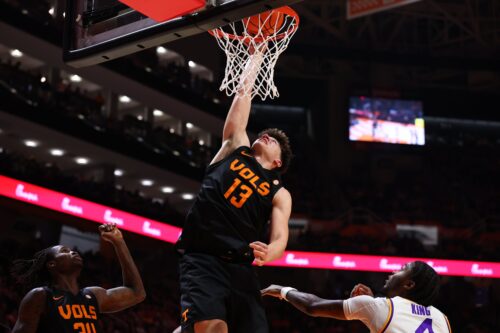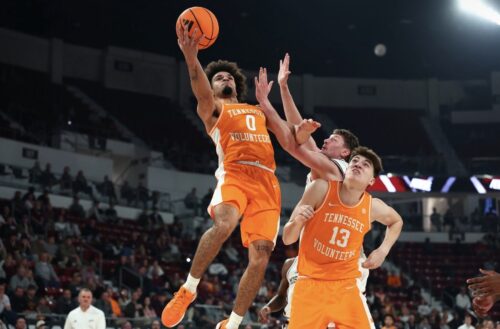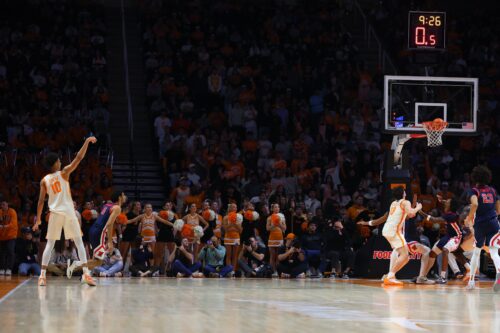
Tennessee Basketball is ready to start their 2024/25 season.
As Tennessee basketball gears up for the new season with an exhibition charity game against Indiana on Sunday, October 27th, questions linger about whether the Vols can replicate last year’s success. Coming off a strong season that included a run to the Elite Eight, the Vols face a major test as they enter 2024 with significant roster turnover and new faces ready to step up.
Tennessee’s biggest challenge this season will be replacing key players who played pivotal roles last year. First-round NBA pick Dalton Knect, alongside veteran leaders Josiah Jordan James and Santiago Vescovi, have all moved on, leaving a considerable void in both experience and scoring. The team has also seen the exit of four players through the transfer portal: Freddie Dilione (Penn State), Tobe Awaka (Baylor), Jonas Aidoo (Arkansas), and DJ Jefferson (Longwood). These departures have reshaped the roster, forcing head coach Rick Barnes to look for talent in the transfer portal and through young, emerging players.
Tennessee responded by adding some key transfers, starting with center Felix Okpara from Ohio State, forward Igor Milicic Jr. from Charlotte, and guard Chaz Lanier from North Florida. Okpara brings size and physicality to the frontcourt, while Milicic, a versatile 6’10” forward with shooting ability, aims to stretch defenses with his three-point range. Lanier, one of the most sought-after transfers in the offseason, brings athleticism, scoring, and lockdown defense that could make him a game-changer.
Despite losing several key contributors, Tennessee retains three major players from last season’s squad: Zakai Zeigler, Jahmai Mashack, and Jordan Gainey. Zeigler, the reigning SEC Defensive Player of the Year, is back after a stellar season and is the only Vol named to the preseason All-SEC team. His on-ball defense and playmaking ability will be critical to Tennessee’s success, but the question is whether he can elevate his offensive game to help fill the scoring void left by the departures.
Jahmai Mashack is also returning and has reportedly improved his offensive skill set significantly in offseason practices. Known for his elite defense, Mashack’s development as a two-way player could be one of the keys to Tennessee’s season. Jordan Gainey, who was expected to be a volume shooter last season, will have another opportunity to fill that role. Whether Gainey can emerge as a consistent scoring threat will be crucial to avoiding the offensive droughts that plagued Tennessee at times last year.
Tennessee also brings back a crop of young players with tremendous potential, including forwards J.P. Estrella and Cade Phillips, both of whom saw limited minutes last season. With Jonas Aidoo and Tobe Awaka now gone, these young forwards have an opportunity to step up and earn more playing time. Their development could play a vital role in Tennessee’s frontcourt depth as the season progresses.
Cameron Carr, a highly athletic guard, is another player who could make an impact. His explosiveness and raw athleticism make him an intriguing option, but he may face challenges for minutes with more experienced players ahead of him in the rotation. Whether Carr can carve out a significant role or remain in a developmental stage will depend on his consistency and performance early in the season.
The Vols also added talented freshman guard Bishop Boswell, a standout from Charlotte, North Carolina. While Boswell may see limited action behind Zeigler, he is viewed as a potential long-term successor at the point guard position. His progression throughout the season will be worth watching as Tennessee prepares for life without Zeigler in the future.
One of the biggest questions surrounding Tennessee this season is how well the incoming transfers will adapt to Rick Barnes’ system. Felix Okpara arrives with plenty of potential, though his time at Ohio State didn’t quite pan out as expected. His physicality and ability to play around the rim make him a perfect fit for Barnes’ defensive and post-centric system, but he’ll need to improve on the offensive end to make a bigger impact.
Igor Milicic Jr., on the other hand, brings a different skill set. As a 6’10” sharpshooter, he can stretch the floor and help Tennessee with its long-standing issue of scoring droughts. His shooting touch from deep will be especially valuable in games where the offense stalls.
Perhaps the most exciting addition is Chaz Lanier, a dynamic guard whose athleticism and all-around game have drawn attention across the league. Tennessee beat out powerhouse programs like Kentucky to land Lanier, who brings scoring, defense, and versatility to a team in need of new leaders. Lanier’s ability to make an immediate impact will be critical if Tennessee hopes to make another deep NCAA Tournament run.
While Tennessee’s roster has undergone significant changes, there is still optimism surrounding the program. The team’s defense, always a hallmark under Rick Barnes, should once again be elite. With Zeigler leading the way and Mashack locking down perimeter players, Tennessee could have one of the best defenses in the SEC. The bigger question will be on offense. Last year, Tennessee’s scoring inconsistency proved costly in key games, and with the departure of its top scorers, the Vols will need players like Gainey, Lanier, and Milicic to step up. Can Tennessee develop a reliable offensive rhythm, or will scoring droughts continue to haunt them in close games?
As Tennessee basketball begins the 2024 season, fans have reason to be both hopeful and cautious. The Vols’ mix of returning talent, exciting transfers, and promising young players gives them a chance to remain competitive in the SEC and beyond. However, the loss of key veterans and uncertainty on offense will require this new-look roster to find its identity quickly. Will Tennessee make another run to the Elite Eight or beyond, or will this be a year of growing pains and adjustments? Only time will tell, and it all begins with their exhibition game against Indiana.



